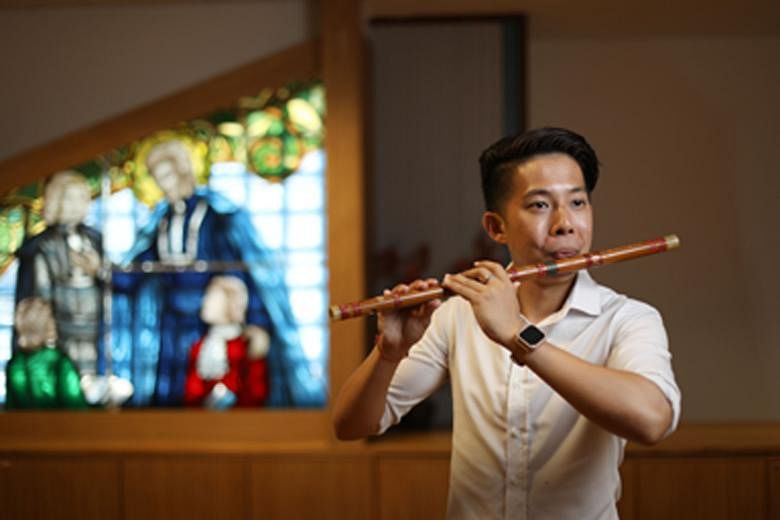The only music teacher at St Gabriel's Secondary School has a condition that you would think disqualifies him: he is partially deaf.
Suffering from high frequency hearing loss in his right ear and tinnitus in his left, Mr Ong Ting Kai hears only the bass line and drum beats in a piece of music.
That has not stopped the 29-year-old from passing on his passion for music to the next generation for the last four years.
The well-spoken educator with an easy smile is candid with his students about his hearing loss.
"There's no hiding from them; teenagers are very sharp," he said with a laugh, pointing to the translucent hearing aids tucked inconspicuously in his ears.
Without the devices, the music teacher with a diploma in dizi performance can barely catch a conversation, having lost 50 and 30 per cent of his hearing in his right and left ears respectively.
But music has not always sounded muffled to Mr Ong. Once a rising star in the local dizi scene, he spent most of his growing years in pursuit of a professional career in music, before the tables were turned on him.
Diagnosed in 2009, just before he entered the army, he was told by doctors he would be completely deaf by the time he turned 45 if he did not take good care of his ears.
The news was a huge blow for the then 19-year-old, who had spent the better part of his life training to be a professional dizi player.
In a wrenching twist of fate, the piercing sounds of the Chinese bamboo flute may have caused the damage to the hair cells in his ears, leading to the gradual hearing loss, according to two specialists.
Mr Ong began learning music at nine, when his mother instructed him to follow his elder sister and join the school Chinese orchestra. It was there that he picked up the dizi.
"That a simple piece of bamboo can produce such beautiful music, with such a strong history and culture - it hooked me," he said.
His talent caught the attention of his music teacher, and he was chosen for the exclusive Young Talent Programme at the Nanyang Academy of Fine Arts (Nafa).
There, he practised the flute under the watchful eye of one of the biggest names in the dizi world, Professor Zhan Yong Ming, rising steadily to become one of the most prominent young players in the nation.
Besides securing a place in the highly selective Singapore Youth Chinese Orchestra (SYCO), he also won the Singapore Chinese Music Competition both times he participated, in 2002 and 2004.
He achieved feats few his age have accomplished, including performing in two concertos alongside the Singapore Chinese Orchestra at the tender age of 15.
With his trajectory seemingly set, it came as a surprise to everyone when he opted to go to Victoria Junior College (VJC) through the Direct School Admission scheme after his O levels, instead of pursuing a diploma in music at Nafa.
He had decided to take his mother's advice to get a university degree before chasing his childhood dream.
Speaking in Mandarin, Madam Yeap Kim Lean, 56, said: "He was torn between the two choices at that time. I told him that the path of professional music would be tough. I didn't want him to suffer.
"As our family was not wealthy, I had hoped he would have a stable career.
"I let him learn music because he was very playful as a child, and it is said that a child who learns music wouldn't go astray," she said.
His mother, a homemaker, would sit in for his weekly one-hour private lessons with Prof Zhan, just so she could help him with his dizi practice at home.
Though they had modest means, the family also fought to keep Mr Ong in the music programme despite the burden of tuition fees.
His father juggled three jobs, as a newspaper vendor, coffee shop assistant and a deliveryman, to support his wife and three children.
More than once, his mother had to plead with the music school to allow a late payment of fees.
"We were not well to do, but my parents gave me everything they could," said Mr Ong, who is single.
Up until JC, he had never thought about doing anything else but playing music professionally.
That changed when Madam Wee Liang Ee, his co-curricular activity teacher in VJC, encouraged him to explore a path in teaching music.
It was also around then that he noticed he had trouble understanding others during conversations. A pre-national service check-up suggested he might be losing his hearing in the right ear.
Unaware of how badly his ears were damaged, he brushed it off and continued practising as normal.
After the A levels, he was accepted into the National Institute of Education to become a teacher.
Riding the bus one evening, he experienced a continuous ringing in his left ear, and felt the world spinning around him. He got off the bus and threw up.
What he thought was motion sickness turned out to be Meniere's Disease, an inner ear disorder associated with dizzy spells and tinnitus - the perception of noise or ringing in the ears.
The attacks became more frequent - three to four times a week, lasting hours - so much so that the outgoing young man could barely get out of bed.
Uncertainty weighed him down, as his hopes of becoming a music teacher seemed unattainable.
"I would stare at the wall for hours thinking that my life was over at 21," recalled Mr Ong.
Madam Yeap remembers it as a low point in her son's life. "I was very sad seeing him in such a state. I worried a lot about his future, if his career as a music teacher would be affected because of his condition."
The wake-up call came from a group of childhood friends, who admonished him.
"They said, 'Ting Kai, what are you doing? You're 21 - this is the best time of your life. Don't lock yourself in the room. You're wasting time, wasting your life.'
"That knock on the door was like a knock on my head," Mr Ong said.
Things picked up from there, as the frequency of attacks decreased after he entered university and eventually stopped altogether, though the ringing in his left ear remains.
He shook his head when asked if he had regrets about never achieving his dream of playing music professionally.
He said: "What I'm doing now is the best of both worlds. I get to teach, and I get to play music.
"Teaching is a kind of performance, except for a very different audience. As a musician, you stand in the spotlight and perform for a few minutes for the enjoyment of the audience - and your own glory.
"As a teacher, you're performing for the students for those two years or so, teaching them about art and values. As a teacher, you can do so much more."
TO VOTE, GO TO STR.SG/STGGA19


